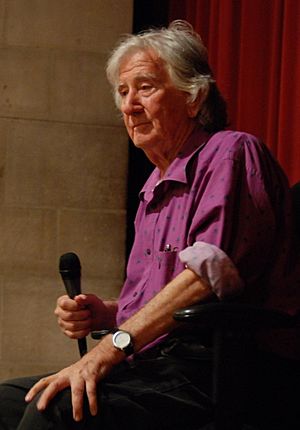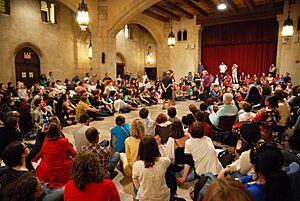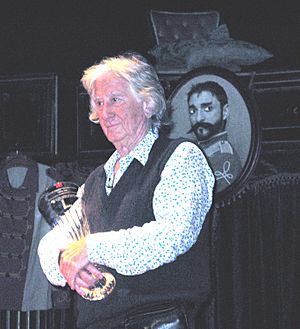Augusto Boal facts for kids
Quick facts for kids
Augusto Boal
|
|
|---|---|

Boal presenting a workshop on the Riverside Church in New York, 13 May 2008.
|
|
| Born | 16 March 1931 Rio de Janeiro, Brazil |
| Died | 2 May 2009 (aged 78) Rio de Janeiro, Brazil |
| Occupation | Theatre practitioner |
| Genre | Theatre of the Oppressed |
Augusto Boal (born March 16, 1931 – died May 2, 2009) was a Brazilian theatre maker, writer, and activist. He created a special type of theatre called Theatre of the Oppressed. This theatre style was first used in movements that aimed to educate people and bring about social change. Boal also worked as a city council member in Rio de Janeiro from 1993 to 1997. During this time, he developed a new idea called legislative theatre.
Contents
Augusto Boal's Life Story
His Early Years
Augusto Boal studied at Columbia University in New York. There, he learned from a famous critic named John Gassner. Gassner taught Boal about the theatre techniques of Bertolt Brecht and Konstantin Stanislavski. He also encouraged Boal to connect with other theatre groups.
In 1955, Boal put on two of his own plays. A year later, after finishing his studies, he was asked to work at the Arena Theatre in São Paulo, Brazil. Boal directed plays and started trying out new theatre styles. He used methods he learned in New York, like Stanislavski's 'system' for actors. Boal changed these methods to fit Brazil's social situation. He focused on ideas about nationalism, which were very popular after a long period of military rule.
Working at the Arena Theatre
At the Arena Theatre in São Paulo, Boal directed many classic plays. He changed them to make them more meaningful for Brazilian society. One of these plays was John Steinbeck's Of Mice and Men. This was Boal's first play as a director at the Arena Theatre. Critics loved it, and Boal won an award for best new director in 1956.
In the early 1960s, the Arena Theatre started losing money. To save it, the company decided to focus on plays written by Brazilian writers. This idea worked well and helped create a strong national theatre scene. Boal then suggested starting a special workshop for playwrights at the Arena Theatre. This workshop became a place where many young Brazilian writers could develop their plays. Many successful plays came from this workshop.
Life in Exile
In 1964, a new military government took power in Brazil. Boal's ideas were seen as a threat by the government. In 1971, he was forced to leave the country and went to Argentina. He stayed there for five years.
While in Argentina, Boal wrote two important books. One was Torquemada (1971), which talked about how the Brazilian military government used harsh methods. The other was his famous book, Theatre of the Oppressed (1973). In this book, Boal developed a theatre method based on Pedagogy of the Oppressed. This was a book by his good friend, the Brazilian educator Paulo Freire.
Boal's theatre method aims to turn audience members into active participants. He believed that traditional theatre was unfair because viewers couldn't express themselves. He thought that if everyone worked together, theatre could help people feel free. Boal wanted to change spectators into "spect-actors."
After Argentina, Boal traveled to other South American countries like Peru and Ecuador. He worked with people in poor communities facing problems like civil wars. Boal believed that only those who are struggling can truly help others who are struggling. In Peru, he used his Forum theatre method. In this method, an audience member takes the place of an actor to find solutions to a problem. This problem could even be a real issue someone in the community was facing.
Boal also lived in Paris, France, for several years. There, he started many Centers for the Theatre of the Oppressed. He directed plays and taught classes at the Sorbonne University. In 1981, Boal created the first International Festival for the Theatre of the Oppressed.
While Boal was away, his friend, the Brazilian musician Chico Buarque, wrote him a famous song called "Meu Caro Amigo" (My Dear Friend). In this song, Buarque subtly described the situation in Brazil under the military government. Artists had to be clever because of censorship.
Theatre of the Oppressed in Brazil
After 14 years, Boal returned to Brazil in 1986. He started a big Center for the Theatre of the Oppressed (CTO) in Rio de Janeiro. The CTO's goal was to explore issues about being a citizen, culture, and different types of unfairness using theatre. Boal's work at the CTO helped create a new law in Brazil that protects crime victims and witnesses. His group also worked with many organizations that fight for human rights.
In 1992, Boal ran for city council in Rio de Janeiro as a kind of theatre act, and he won! His theatre group helped him develop new ideas for laws. He wanted to use theatre to discuss problems citizens faced in their communities. He also wanted to talk about Rio's laws with people on the streets. Boal started the "legislative theatre" movement. In this, voters become lawmakers.
Boal often said that he didn't just make up laws. Instead, he asked people what they wanted. Other politicians didn't always like this. Out of 40 laws Boal suggested, only 13 were approved during his time as a council member. His term ended in 1996, but he kept doing legislative theatre with other groups in Brasília. Four more laws were approved there, even after he left.
Boal also worked with prisoners in Rio and São Paulo. He believed that even though prisoners weren't free in terms of space, they were free in time. He thought Theatre of the Oppressed could help them imagine and think about their past, present, and future. This was meant to help prisoners have a "healthier and more creative lifestyle." People in the Landless Workers Movement of Brazil also used Boal's theatre methods. Boal's son, Julián, worked with his father and now continues to share the Theatre of the Oppressed around the world. In March 2009, Boal was named "World Theatre Ambassador" by UNESCO.
His Passing
Augusto Boal passed away on May 2, 2009, in Rio de Janeiro, at the age of 78. Many believe he is the most famous and respected Brazilian theatre artist known internationally.
Who Influenced Boal?

Many of Augusto Boal's theatre techniques came about when he realized that traditional political theatre wasn't always effective in poor areas. He found that his efforts to inspire people to fight against unfairness were sometimes limited. His new methods allowed the ideas for change to come from the people themselves. Much of his early work was inspired by ideas about social equality and economic justice.
Paulo Freire was a big influence on Boal's teachings. They became close friends later in life. When Freire died, Boal said he felt like he had lost his last father.
Boal also liked to quote William Shakespeare's Hamlet. In the play, Hamlet says that theatre is like a mirror that shows us our good and bad sides. Boal found this beautiful, but he thought theatre was a mirror where you could reach in and change reality.
His Published Books
Theatre of the Oppressed (1979)
This is one of Augusto Boal's most important books. In it, he looks closely at the history of Western theatre. Boal believed that traditional theatre often kept people from expressing themselves. He argued that certain types of plays helped governments stay in power. He then shared his early ideas and practices for changing this.
The book also talks about different theatre forms:
- Newspaper Theatre: This uses news stories to discuss local problems with the audience.
- Forum Theatre: This is used in over 70 countries. An audience member replaces an actor to find solutions to a problem.
- Invisible Theatre: This is a planned event that happens in a public place, but the audience doesn't know it's a play. Actors perform unusual roles to make people think or join in. For example, actors might pretend to argue about food prices in a restaurant. This makes other diners discuss the issue.
- Image Theatre: This uses body shapes and frozen poses to show feelings or ideas without words.
- Analytical Theatre: A participant tells a story, and actors act it out. Each character's social roles are explored, showing how people can have many different roles.
Theatre of the Oppressed has been translated into more than 25 languages.
Games For Actors and Non-Actors (1992)
This is probably Boal's most useful book for people who want to practice his theatre methods. It gives a short explanation of his ideas through stories and examples. Then, it explains many drama exercises that he found helpful. Unlike Theatre of the Oppressed, this book has less academic theory and more practical examples. Boal called many of these "gamesercises" because they combine training with fun. This book has been very important for community theatre and theatre education around the world.
The Rainbow of Desire: The Boal Method of Theatre and Therapy (1995)
This book looks at Boal's theatre practices for a new purpose. It explores how theatre can help people find peace within society. While his early work focused on challenging unfair systems, this book shows how his methods can help individuals deal with their own inner struggles. Boal believed that theatre could help people break down internal barriers that separate them from society.
Through his work in Europe, including with people in mental health institutions, Boal developed ideas like the "Cop in the Head." This book's theories have been very helpful in the field of drama therapy.
Boal also described three important qualities of the "aesthetic space" (the space where theatre happens):
- Plasticity: Objects can take on different meanings. For example, an old chair could become a king's throne.
- Dichotomy: There is a space within a space. The stage is in front of the audience, but the actor also creates their own space.
- Telemicroscopic: It's hard to hide on stage. Everything in the space is seen, making distant things seem close up.
Other Books by Boal
- Legislative Theatre: Using Performance to Make Politics. London: Routledge, 1998.
- Hamlet and the Baker's Son: My Life in Theatre and Politics. London: Routledge, 2001.
- The Aesthetics of the Oppressed. London: Routledge, 2006.
Awards and Recognition

In 1994, Boal received the UNESCO Pablo Picasso Medal. In August 1997, he won the "Career Achievement Award" from the Association of Theatre in Higher Education. Boal is also seen as an inspiration for modern forms of performance-activism.
In 2008, Boal received The Cross Border Award for Peace and Democracy. Boal's ideas have influenced many artists who use new media. This is especially true as the World Wide Web has become a powerful tool for people to participate and communicate.
See Also
 In Spanish: Augusto Boal para niños
In Spanish: Augusto Boal para niños
- Applied Drama
- Community theatre
- Paulo Freire
- Playback Theatre
 | Tommie Smith |
 | Simone Manuel |
 | Shani Davis |
 | Simone Biles |
 | Alice Coachman |

